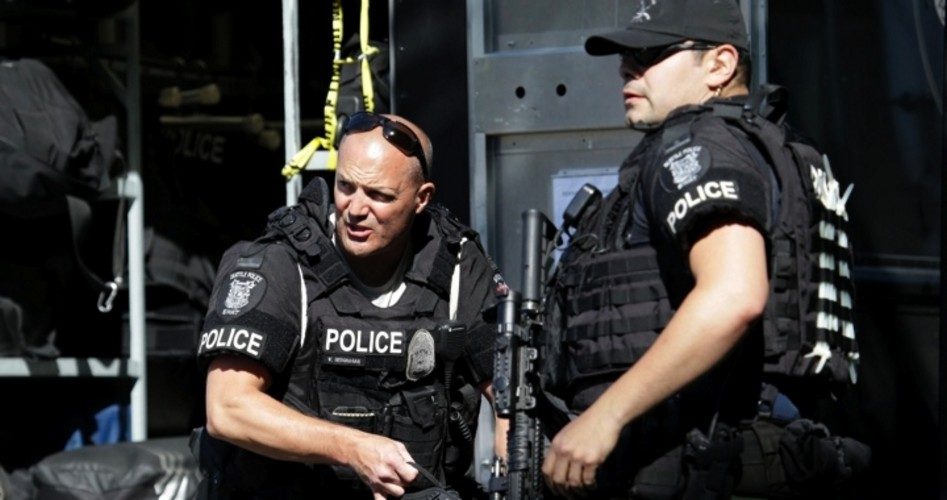
Government agencies have developed very clever ways to hide their acts and paperwork from their bosses, the public. Some of them do it by staying deep in the shadows, such as the CIA or the National Security Agency (NSA). However, a group of regional police agencies in New England, which operate Special Weapons and Tactics (SWAT) teams and are armed with machine guns, armored BearCat vehicles, and other military equipment, have done it by styling themselves as non-profit “religious, charitable, scientific, literary or educational” corporations in order to avoid disclosure of their records.
These agencies are called “Law Enforcement Councils” (LECs), which evoke images of fraternal cooperation between police departments. In most of the country, that is what they are: regional groups of police departments who band together — and often incorporate — for legislative lobbying, getting funding grants, sharing information, and coordinating between jurisdictions. Some of them share equipment such as traffic speed machines.
Only in Massachusetts have these LECs subsumed their police SWAT and other militarized operations, such as locking down the City of Boston after a bomb explosion during its marathon, under the shield of non-profit corporations in order to avoid public scrutiny.
When the American Civil Liberties Union (ACLU) tried to get the documents of one such group, the North Eastern Massachusetts Law Enforcement council (NEMLEC), which is made up of 58 police departments in northeastern Massachusetts, NEMLEC used the excuse that they were just a small non-profit charitable, religious, or educational organization and not a pubic entity, and thus were not subject to freedom of information requests. Never mind that each officer in the SWAT team is a public employee, is paid by public funds, operates publicly owned vehicles and equipment, and works on public safety missions.
The ACLU then sued NEMLEC to obtain their records, under the open records law in Massachusetts. However, NEMLEC has continued to oppose disclosure of the records in court, and has moved to dismiss the lawsuit. “NEMLEC can’t have it both ways,” said an attorney for the ACLU. “Either it is a public entity subject to public records laws, or what it is doing is illegal.”
Each member police force of a Massachusetts LEC is required to pay dues to the organization of many thousands of dollars per year. These dues are paid out of public funds. Certainly they run their policing operations by their public authority granted by the state and each city or town. In other words, they are public employees, doing their public work and getting paid by our taxes.
NEMLEC’s response appears to be a recent change in the purpose of its non-profit charitable corporation status. NEMLEC was founded 40 years ago in 1974, according to Massachusetts secretary of state documents. When it started, it was probably a bunch of police chiefs meeting to swap stories and give each other awards. Perhaps only recently did the group figure out that their non-profit corporation could also serve as a shield to protect their SWAT and military-like activities from disclosure to the public.
Why does this matter? Because these cops raid homes and kill people — sometimes the wrong people, sometimes innocent children. They use heavy armored personnel carriers, and serve “no-knock” warrants on drug houses, where they use automatic weapons and flash grenades.
As public employees, the records of their activities should be open to the public, and individual police departments have always had to produce them. But because the police departments have consolidated their SWAT teams under these regional “Law Enforcement Councils,” they can hide their most violent, most controversial operations under the protection of a charitable corporate veil.
According to a June 26, 2014 article in storyleak.com, SWAT raids have increased from 3,000 a year to over 80,000 a year in the last three decades. Media bring daily reports of drug raids on homes that were mistakenly targeted, and where police sometimes injure or kill innocent persons or pets.
Most of these SWAT raids, conducted by officers armed to the teeth and carrying smoke or flash grenades and battering rams, are part of the so-called “drug war.” Although law enforcement theoreticians are well aware of the ample historical evidence that prohibition does not work, we have continued to use this drug war pretext to ramp up the militarization of local police and to perpetrate a siege mentality in many urban areas.
We should not forget our last experiment with prohibition of liquor, some ninety years ago, which ran from 1920 to 1933. H.L. Mencken, the “sage of Baltimore,” writing during that period, reminds us what a horrible flop it was and how it ended up doing far more harm than good despite the best intentions of “dry” reformers:
Five years of Prohibition have had, at least, this one benign effect: they have completely disposed of all the favorite arguments of the Prohibitionists. None of the great boons and usufructs that were to follow the passage of the Eighteenth Amendment has come to pass. There is not less drunkenness in the Republic, but more. There is not less crime, but more. There is not less insanity, but more. The cost of government is not smaller, but vastly greater. Respect for law has not increased, but diminished.
Modern police departments have changed from a “protect and serve” model to an “us versus them” mentality and culture. In the new model, citizens have become enemies of the state, and “officer safety” is the primary concern, not the rights of the people. Officers are trained to escalate at the slightest perception of a threat, and will bring criminal charges of resisting arrest, disturbing the peace, or disorderly conduct with little provocation.
In that highly charged police-state atmosphere, it is critical that citizens be afforded the opportunity to see public records about police SWAT activities, regardless of whether the police style themselves a “charitable” corporation. Hopefully, the lawsuit filed by the ACLU will succeed in piercing that barrier, and the result will be more accountability by police and fealty to the Constitution in their operations, because they know they are being scrutinized.
Photo: AP Images



